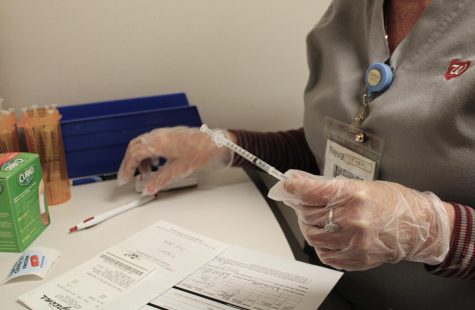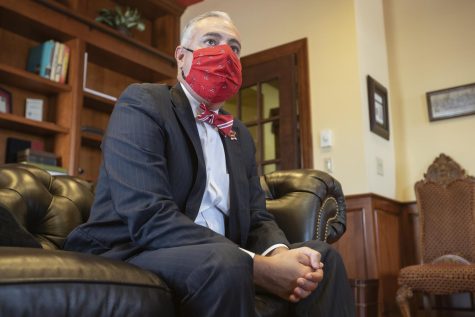2020 Census rates, data may be affected by student move-outs
May 8, 2020
This story was published in the May 8 final print issue. Read the full issue here.
The 2020 Census has been impacted heavily by the COVID-19 pandemic that has swept over the nation. Universities closed their doors, and students were required to move out and return to their homes, which may be having an impact on the national census rates.
President Timothy Caboni sent an email to all WKU students, faculty and staff on March 17 announcing the halting of physical classes for the remainder of the spring semester and the beginning of online instruction. The email also urged students who lived in university housing to go home if possible.
Students who lived in on-campus housing for more than six months out of the year were already counted by the university.
“We will still submit [students living on campus’] status as living at school for more than six months of the year, August to March,” said Lana Kunkel, Housing and Residence Life Associate Director of Housing Operations. “The impact probably is mostly felt with students in off-campus apartments. I fear that they didn’t report before leaving for home, or in the midst of changing to online classes, they forgot to report.”
Kunkel urged students living in off-campus housing for more than six months out of the year as of April 1 to report their Bowling Green address.
“[Report the address] where your lease is at the present moment, not where you are physically,” Kunkel said.
Dormitories, nursing homes and Army barracks are classified as “group quarters” under the US Census Bureau.
Due to this classification, the Group Quarters Enumeration, GQE, is the process used for counting those living in these places.
According to the U.S. Census Bureau’s website, 2020census.gov, because group quarters are owned or managed by a third party, the Census Bureau assists group quarters administrators in responding to the census on behalf of residents to ensure a complete and accurate census count.
Kunkel has been reporting data via the Census’ eResponse program in regard to those students who had lived on-campus.
“The only impact is that move-out has slowed me down in reporting the data,” Kunkel said. “Originally I was to report our hall numbers between April 1 and May 1. But the deadline to report has been pushed back to October, so I am still uploading campus residence hall and apartment numbers, given the situation.”
Bowling Green City Commissioner Sue Parrigin said that the tract rate around WKU in comparison to the rest of the city shows the discrepancy amongst college students. Parrigin also belongs to Bowling Green’s Complete Count Committee, or CCC. According to the Census Bureau’s website, CCCs are key to creating awareness in communities all across the country.
“[Students who lived in off-campus housing] will have the tendency to think that they should be counted in whatever community they’re residing in now, and that’s not how it is at all,” Parrigin said.
As of April 30, Kentucky’s self-response census rate was 59.2% and Bowling Green’s was 51.8%. This data is provided by the response rates map on the Census Bureau’s website. Data shown on this map changes every day.
“It’s really critically important we have this data and it’s accurate,” Parrigin said.
Anyone residing in the U.S. is able to self-respond to the 2020 Census by mail, phone or online. This year’s census is the first to conduct online self-reporting.
“It’s a great interest for WKU for students to be counted here,” Parrigin said. “It helps the representation at the state and federal level advocating for college students.”
WKU has been spreading information about the 2020 Census through social media posts, emails, WBKO and View from the Hill.
“[The university has] exhausted pretty much everything they have,” Parrigin said. “I don’t know if there’s anything more they could be doing.”
In his letter to students, Vice President of Enrollment & Student Experience Brian Kuster informed students of the importance of the census.
“From the way in which legislative districts are drawn and the number of seats allocated to each state in Congress to revising school district boundaries, funding fire departments and roads, locating businesses, and planning for hospitals and nursing homes, Census data infiltrates our lives in substantial ways – guiding how more than $675 billion in federal funding gets distributed each year,” Kuster said in the letter that can be viewed on WKU’s website, WKU.edu/census.
Kentucky Gov. Andy Beshear has also been urging the public to fill out the 2020 Census in his daily coronavirus briefings, telling Kentucky residents that doing so will help raise the state in rankings and help the state rebuild after the pandemic ends.
“The governor has been fantastic in getting the word out,” said Fernando Armstrong, director of the U.S. Census Bureau’s Philadelphia Regional Office. “We are very, very appreciative.”
Armstrong said there are many positives that can come from filling out the 2020 Census.
“Going forward if we were to experience something like this in the future, any kind of disaster or challenging moment, those decisions that need to be made need to have accurate, fresh, reliable data, and that will come from the 2020 Census,” Armstrong said. “We have this opportunity once every 10 years. If we miss this opportunity we might not have the right decisions made.”
Armstrong said he hopes students are listening to their universities and communities, and he stressed the fast, remote online self-reporting.
Due to the COVID-19 pandemic, the 2020 Census deadline has been extended until Oct. 31. This extended date has been implemented to give people more time to be able to be counted while abiding by the instructions from the governor and the Centers for Disease Control and Prevention in terms of social distancing, according to Armstrong.
“In all cities, including Philadelphia and Washington [D.C.], we are seeing that the colleges and universities are also very actively promoting and interacting with students to participate [in the 2020 Census],” Armstrong said. “It is a little bit more pronounced in Bowling Green. It’s the nature of where we are I think that the college population, the students, wherever they are, in town or back at home or moved on to other locations, they realize that whenever they come back to the university, they need the services they were using, proper housing, proper health benefits, other services and benefits that students looking at a career want.”
Armstrong thanked WKU for spreading information regarding the 2020 Census to the community.
“I want to one more time encourage all your leaders to take advantage of this opportunity we have in 2020,” Armstrong said. “I want them to take the opportunity to do their civic duty for a good count, so our communities, our children, our students, our senior citizens, everyone can benefit. I want to give my thanks to WKU. There has been more effort and more support from the university than from a lot of other universities in the country. Many messages, videos, constant very helpful messages coming out of the university. It’s very refreshing and very encouraging.
“The young people of Kentucky and those who attend WKU are encouraged and motivated and doing the right thing for their college, the city and the country.”
News reporter Cassady Lamb can be reached at [email protected]. Follow her on Twitter at @lambp0p.




















